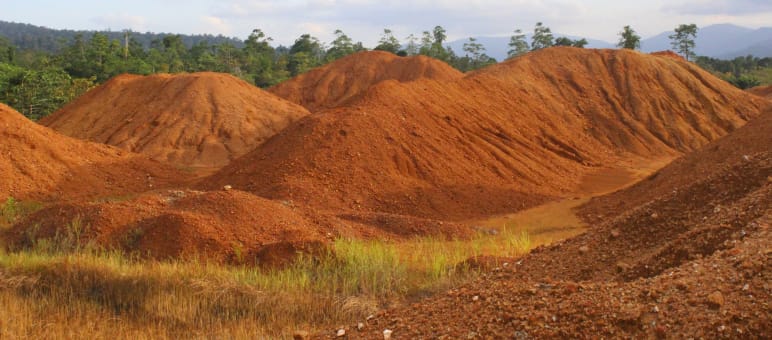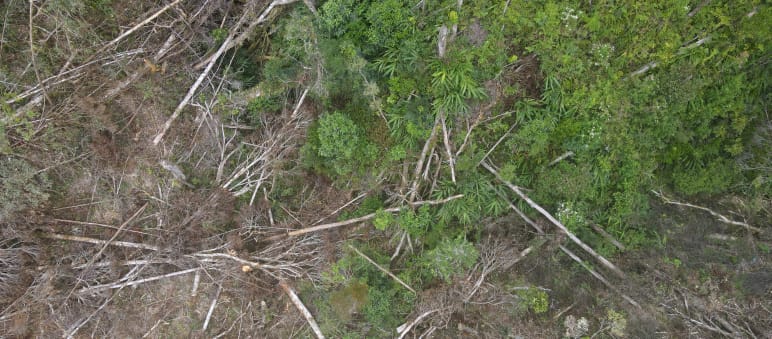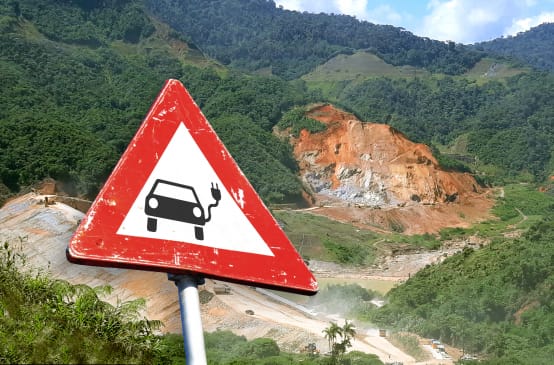Open letter to Elon Musk from Indonesia: NO to nickel mining for EVs!
: Indonesia has large nickel deposits in Sulawesi and the Moluccas. The mining of nickel, its smelting and transport as well as the construction of factories are destroying the rainforest, the Coral Triangle and human livelihoods. Indonesian environmental groups have written an open letter to Tesla Motors CEO Elon Musk.
Electric cars are being touted everywhere as a solution to the climate crisis. And while "energy transition" and "renewable energy" are buzzwords du jour for the automotive industry, the production of electric vehicles requires huge quantities of metals – nickel in particular. Ensuring the supply of nickel to car battery factories is therefore crucial to the industry.
In 2020, Indonesia stopped exporting unprocessed nickel to become a producer of nickel steel in the future and to supply the world with nickel-based car batteries. Several nickel smelters have started operation and others are under construction. Special industrial zones are being established, mostly operated by Chinese corporations. The Brazilian Vale group is also a giant in the sector. The US manufacturer Tesla Motors is currently leading the race for the world's nickel deposits.
Russian nickel supplies, which previously covered 8.4 percent of demand, have collapsed due to the war in Ukraine. Indonesia aims to fill this gap by increasing the mining of nickel ores and the production of products such as nickel steel and batteries. As the largest supplier, Indonesia has so far accounted for 19 percent of the world's supply of nickel ores.
Tesla Motors CEO Elon Musk and Indonesia's Coordinating Minister for Maritime Affairs and Investment Luhut Panjaitan met several times in recent weeks to negotiate mining, smelting and battery factories under the banner of the transition to "green energy". The construction of an Indonesian gigafactory for electric cars also appears to be on the agenda. Even President Joko Widodo took the time to meet with Elon Musk and discuss future business relations.
Environmental groups, particularly from the island of Sulawesi, where Indonesia's largest nickel reserves are located, are alarmed by the rush for nickel:
"We are deeply concerned as our years of work teach us that the nickel industry is devastating to the environment, that indigenous peoples and environmentalists will be criminalized for opposing the destruction of their lands, and that there will be further violations of rights along the production chain," they write in an open letter to Elon Musk and Tesla investors.
The signatories, groups belonging to the WALHI environmental network (Friends of the Earth Indonesia) of the island of Sulawesi, have been experiencing the massive expansion of nickel mining in recent years. They note that nearly 700,000 hectares of rainforest have already been allocated to mining companies. Not only is the rainforest being destroyed, but rivers and the sea are being contaminated with toxic mining sludge: "The clearing of 4,449 hectares of rainforest in South Sulawesi has resulted in Lake Mahalona, its tributaries and the entire coastal region becoming silted up," the environmentalists wrote to Elon Musk.
Whole islands are sacrificed for nickel, for example in the Moluccas, even though mining on coasts and small islands is prohibited by law. The sea is being polluted by tailings and mine sludge. The coastal population, which traditionally lives from fishing, is losing its livelihood as the marine wildlife is being destroyed.
"Nickel mining is also harming democracy and freedom of expression," the environmentalists argue in the letter to Tesla. In several locations in Sulawesi, local people have been arrested and interrogated. At least four indigenous people were jailed after protesting the expansion of nickel mining by the Brazilian corporation Vale in March 2022. Vale holds large nickel mining concessions in Sulawesi.
The everyday life of the population in the rainforests has changed completely since large areas were opened up for nickel mining. Special industrial zones with nickel smelters and battery factories, in which civil and worker rights are tightly restricted, are being established near the Morowali Nature Reserve and on the Molucca island of Weda. The local oeople, fishermen and farmers are losing their livelihoods.
"The pollution of water and air, land grabs and the loss of fields make life particularly difficult for women in this patriarchal society. They now have to work virtually around the clock to support their families," the letter to Tesla said.
The WALHI groups demand:
- No further expansion of nickel mines
- No new investments in the nickel industry
- Respect for human rights
Other environmental groups such as JATAM and AEER have also written letters to Tesla and Tesla investors. They are alarmed by plans to dump tailings from the mining of nickel ores in the deep sea. This process is destroying marine life in the Coral Triangle, an area known internationally for its biodiversity.
Concrete plans for deep-sea dumping exist for three marine areas in the Coral Triangle in the immediate vicinity of the Morowali (Sulawesi), Obi and Weda (Moluccas) special industrial zones.
JATAM and AEER also criticize the use of coal power for ostensibly "green" energy based on nickel batteries, reminding Elon Musk of his own appeal in September 2020, not to destroy the environment.
In contrast, policymakers and the press have been enthusiastic: The German business magazine Capital headlines: Tesla Defies the Nickel Crisis. In 2021, Tesla concluded supply contracts with the Brazilian mining giant Vale and others. The Indonesian magazine Tempo quotes Minister Luhut Panjaitan – currently the most powerful man in the archipelago – as saying that Elon Musk visited Indonesia to talk about the energy transition.
Indonesian environmentalists will continue to speak out against this kind of "green energy" at the expense of the rainforest and its inhabitants.



